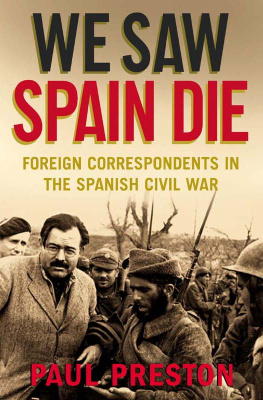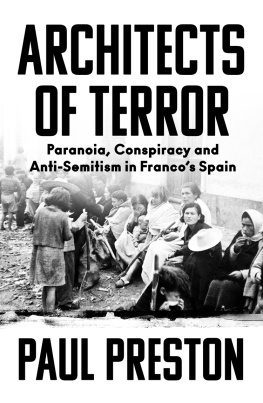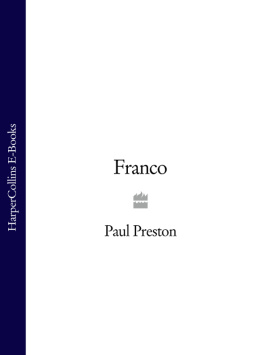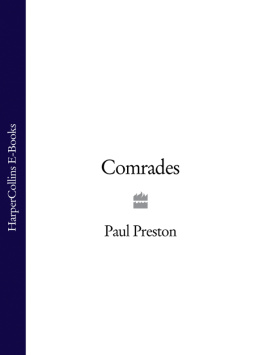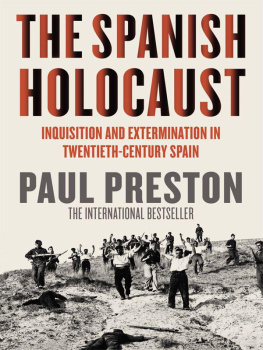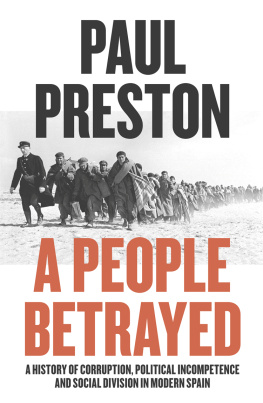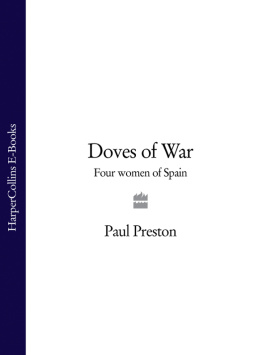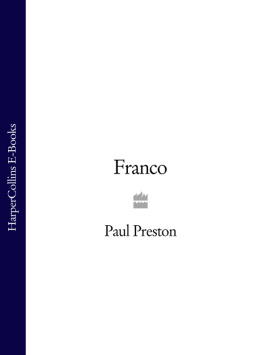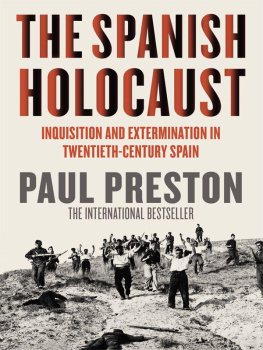Paul Preston - We Saw Spain Die
Here you can read online Paul Preston - We Saw Spain Die full text of the book (entire story) in english for free. Download pdf and epub, get meaning, cover and reviews about this ebook. publisher: Constable, genre: Politics. Description of the work, (preface) as well as reviews are available. Best literature library LitArk.com created for fans of good reading and offers a wide selection of genres:
Romance novel
Science fiction
Adventure
Detective
Science
History
Home and family
Prose
Art
Politics
Computer
Non-fiction
Religion
Business
Children
Humor
Choose a favorite category and find really read worthwhile books. Enjoy immersion in the world of imagination, feel the emotions of the characters or learn something new for yourself, make an fascinating discovery.
- Book:We Saw Spain Die
- Author:
- Publisher:Constable
- Genre:
- Rating:4 / 5
- Favourites:Add to favourites
- Your mark:
- 80
- 1
- 2
- 3
- 4
- 5
We Saw Spain Die: summary, description and annotation
We offer to read an annotation, description, summary or preface (depends on what the author of the book "We Saw Spain Die" wrote himself). If you haven't found the necessary information about the book — write in the comments, we will try to find it.
We Saw Spain Die — read online for free the complete book (whole text) full work
Below is the text of the book, divided by pages. System saving the place of the last page read, allows you to conveniently read the book "We Saw Spain Die" online for free, without having to search again every time where you left off. Put a bookmark, and you can go to the page where you finished reading at any time.
Font size:
Interval:
Bookmark:
SPAIN DIE
SPAIN DIE
THE SPANISH CIVIL WAR
CONSTABLE LONDON
Constable & Robinson Ltd
55-56 Russell Square
London WC1B 4HP
www.constablerobinson.com
First published in the UK by Constable, an imprint of Constable & Robinson, 2008
Copyright Paul Preston, 2008, 2009
The right of Paul Preston to be identified as the author of this work has been asserted by him in accordance with the Copyright, Designs & Patents Act 1988.
All rights reserved. This book is sold subject to the condition that it shall not, by way of trade or otherwise, be lent, re-sold, hired out or otherwise circulated in any form of binding or cover other than that in which it is published and without a similar condition including this condition being imposed on the subsequent purchaser.
A copy of the British Library Cataloguing in Publication Data is available from the British Library
ISBN: 978-1-84529-946-0
eISBN: 978-1-78033-742-5
Printed and bound in the EU
1 3 5 7 9 10 8 6 4 2
To the Memory of Herbert Rutledge Southworth (190899)
I would like to express my gratitude to all those who have helped to make this book possible. In particular, I must thank those who generously helped me locate the diaries, letters and other papers on which the book is principally based: the Very Reverend Dean Michael Allen and his daughter Sarah Wilson, for giving me access to the papers of Jay Allen; Patrick and Ramn Buckley, for lending me materials relating to their father Henry Buckley; Charlotte Kurzke, for granting permission for me to use the invaluable unpublished memoirs of her parents Jan Kurzke and Kate Mangan; Carmen Negrn, for providing access to the papers and photographs held in the Archivo Juan Negrn, Las Palmas de Gran Canaria; Paul Quintanilla, for giving me access to the papers of Luis Quintanilla; and David Wurtzel, for providing me with the diary and other papers of Lester Ziffren.
I am also very happy to record the help of numerous librarians who helped me locate particular papers. For the good-humoured tolerance with which they dealt with my complicated requests regarding the papers of Tom Wintringham and Kitty Bowler, I am indebted to the Staff of the Liddell Hart Centre for Military Archives, Kings College London. Similarly, I am immensely grateful to Andrew Riley and Sandra Marsh of Churchill College Cambridge Archives Centre for their enthusiastic assistance in locating the correspondence between George Steer and Philip Noel-Baker. Gail Malmgreen has, for many years, been unfailingly helpful regarding requests and queries related to the ALBA Collection of the Tamiment Library, at New York University. Kelly Spring of the Sheridan Library, Johns Hopkins University, helped in the location of the Robles papers. Natalia Sciarini of the Beinecke Library, Yale University, went the extra mile in helping find particular items relating to Josephine Herbst. Above all, I want to thank Helene van Rossum of Princeton University Library for help and perceptive advice above and beyond the call of duty regarding the voluminous papers of Louis Fischer.
I am fortunate in the specific help I received regarding particular chapters. This is especially true of the chapter on Mikhail Koltsov, for which I must express my immense debt to Frank Schauff, whose unstinting help with Russian sources was indispensable. Robert Service, Denis Smyth, ngel Vias and Boris Volodarsky all contributed with sage advice and saved me from many errors. Ren Wolf and Gunther Schmigalle provided invaluable assistance on the German dimension of Koltsovs career. For the chapter on George Steer, I benefited from the generous help of Nick Rankin. I would also like to thank Christopher Holme of the Glasgow Herald for sending me material on his namesake who was with Steer in Guernica. For the chapter on Jos Robles, Will Watson generously shared his encyclopaedic knowledge of Hemingway in Spain, and Jos Nieto recounted his recollections of his conversations with John Dos Passos, Artur London and Luis Quintanilla. I was greatly stimulated by the enthusiastic response of Elinor Langer to my questions about Josephine Herbst. On the developments in the press office in Valencia, I benefited from the insights of Griffin Barrys daughter, Harriet Ward. I was also helped by David Fernbach in relation to the role of Tom Wintringham and Kitty Bowler. In Madrid, the indefatigable Mariano Sanz Gonzlez was as helpful as ever. Regarding matters connected with the International Brigades, I turned to Richard Baxell and was never disappointed. I am also indebted to Larry Hannant of the University of Victoria and Professor David Lethbridge at Okanagan College, British Columbia for their help in unearthing material about Kajsa Rothman.
Surviving protagonists are unfortunately now few. I was thus especially glad to be able to benefit from the memories of three people who were in Spain: the late Sir Geoffrey Cox, whose chronicles from besieged Madrid remain important historical sources; Adelina Kondratieva, who was an interpreter with the Russian delegation; and Sam Lessor, who fought with the International Brigades and, after being wounded and invalided home, returned to Spain to work for the Republican propaganda services in Barcelona.
Four friends made a big difference. I ended up writing the book in the first place as a result of an invitation from Salvador Clotas to contribute to the catalogue of the splendid exhibition about foreign correspondents in Spain organized jointly by the Instituto Cervantes and the Fundacin Pablo Iglesias. A trip to Lisbon to take part in the inauguration of the exhibition brought me into contact with its curator, Carlos Garca Santa Cecilia. To meet someone who shared my enthusiasm for the subject was an exhilarating experience and helped convince me that I was not engaged in a totally lunatic enterprise. Will Watson read several chapters with hawk-eyed precision. Lala Isla, as always, has been a fount of affectionate encouragement and I am immensely grateful for her close and sympathetic reading of all the chapters. The generous advice of Soledad Fox on sources and archives in the USA has been crucial. Without her unstinting encouragement and advice, this book would have been infinitely poorer.
It is with great pleasure that I also thank Andreas Campomar, my publisher and friend, for his faith in the project.
Finally, I want to thank the two people who have influenced this book the most. The first is my friend Herbert Southworth, who was a participant in much of what follows. Many years of conversations and correspondence with him taught me much about the Spanish Civil War in general and in particular about the correspondents with whom he had worked. The book is dedicated to him with deep gratitude for his friendship and his example. The other is my wife Gabrielle, who has always been my most lucid critic and reliable supporter. Her acute perceptions regarding the way in which unpalatable truths can be dismissed as bias have been an invaluable foundation for the book.
Every effort has been made to locate the rights holder to the pictures appearing in this book and to secure permission for usage from such persons. Any queries regarding the usage of such material should be addressed to the author c/o the publisher.
Herbert Matthews and Ernest Hemingway in the Old Homestead.
Clipping of LIntransigeants report of the murder of its correspondent, Guy de Traversay. Courtesy of the Instituto Cervantes.
Font size:
Interval:
Bookmark:
Similar books «We Saw Spain Die»
Look at similar books to We Saw Spain Die. We have selected literature similar in name and meaning in the hope of providing readers with more options to find new, interesting, not yet read works.
Discussion, reviews of the book We Saw Spain Die and just readers' own opinions. Leave your comments, write what you think about the work, its meaning or the main characters. Specify what exactly you liked and what you didn't like, and why you think so.

